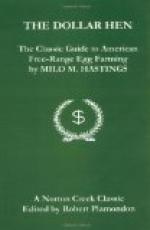Roup.
This disease is a representative of that class of diseases which, while being caused by bacteria, can be considered more of a disease of conditions than of contagion. Roup may be caused by a number of different bacteria which are commonly found in the air and soil. When chickens catch cold these germs find lodgment in the nasal passages and roup ensues. The first symptoms of roup are those of an ordinary cold, but as the disease progresses a cheesy secretion appears in the head and throat. A wheezing or rattling sound is often produced by the breathing. The face and eyes swell, and in severe cases the chicken becomes blind. The most certain way of identifying roup is a characteristic sickening odor. The disease may last a week or a year. Birds occasionally recover, but are generally useless after having had roup.
Sick birds should be removed and destroyed, but the time usually spent in doctoring sick birds and disinfecting houses can in this case be better employed in finding and remedying the cause of the disease. Such causes may be looked for as dampness, exposure to cold winds, or to a sudden change in temperature as is experienced by chickens roosting in a tight house. Fall and winter are the seasons of roup, while it is poorly housed and poorly fed flocks that most commonly suffer from this disease. Flocks that have become thoroughly roupy should be disposed of and more vigorous birds secured. The open front house has proved to be the most practical scheme for the reduction of this disease.
Chicken-Pox, Gapes, Limber Neck.
Chicken-pox or sore-head is a disease peculiar to the South. It attacks growing chickens late in the summer. Southern poultrymen who give reasonable attention to their stock, find that, while this disease is a source of some annoyance, the losses are not severe and that it may be readily controlled. In the first place, the animal epidemic of pox can be practically avoided by bringing the chicks out early in the season. If the disease does develop in the flock, the birds are taken from the coops at night and their heads dipped in a proper strength of one of the coal tar disinfectants. Such treatment once a week has generally been effective. This disease is an exception to the general rule that disinfectants which kill germs also kill the chicken. The explanation is that chicken-pox is an external disease.




